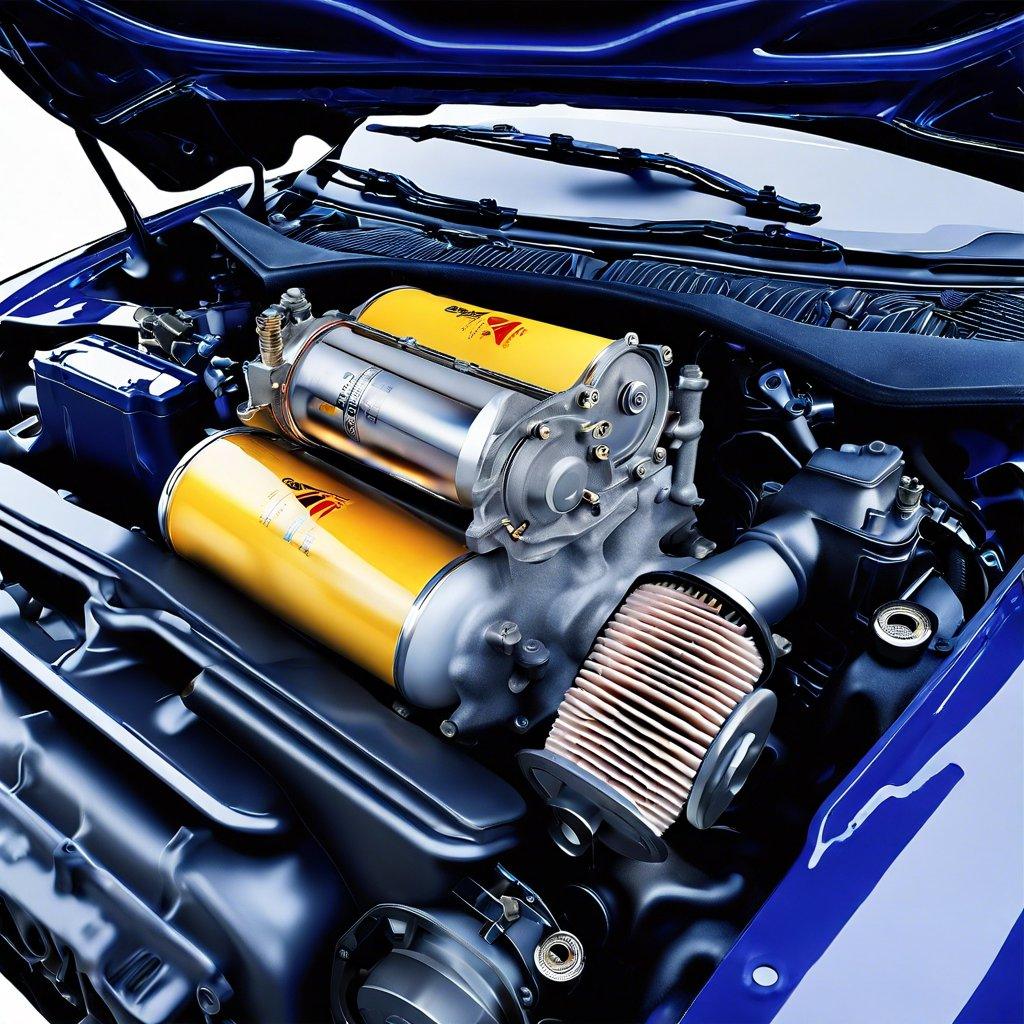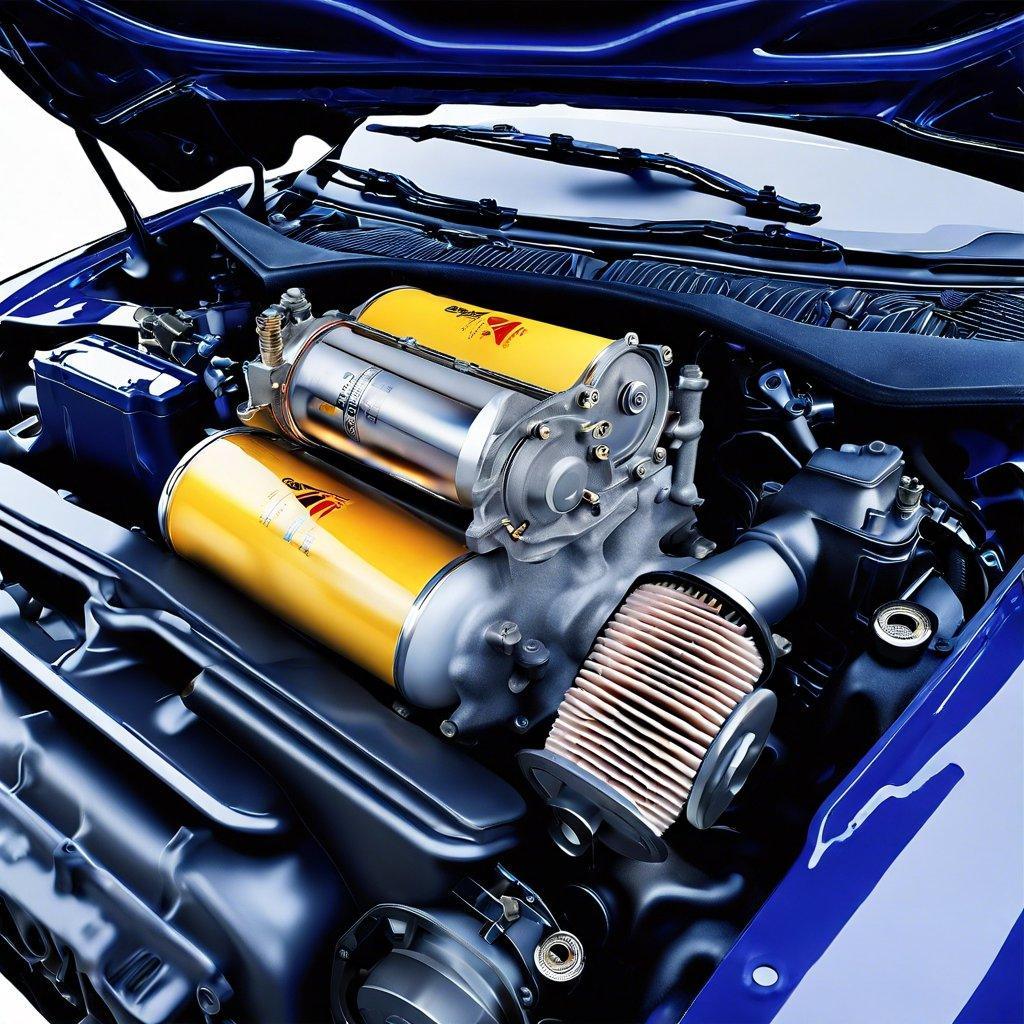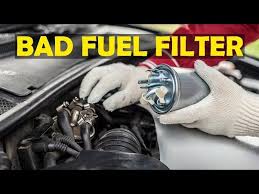Changing Fuel Filters: Recommended Frequency
Maximizing Engine Efficiency: Optimal Fuel Filter Replacement Intervals

Importance of Regular Fuel Filter Replacement
Maintaining optimal engine performance is crucial for any engineering or technology-based organization. One critical aspect of this is ensuring the timely replacement of fuel filters, which play a vital role in preserving engine efficiency and longevity.
Understanding the Fuel Filter’s Role
The fuel filter is responsible for removing impurities and contaminants from the fuel before it reaches the engine. Over time, these filters can become clogged, restricting fuel flow and leading to a range of issues, including reduced fuel efficiency, decreased power output, and even engine damage.
Recommended Fuel Filter Replacement Intervals
The optimal frequency for fuel filter replacement can vary depending on several factors, including:
- Driving Conditions: Vehicles operating in dusty, dirty, or high-particulate environments may require more frequent filter changes.
- Fuel Quality: Lower-quality fuels with higher levels of contaminants can lead to faster filter clogging.
- Vehicle Usage: Vehicles with high mileage or those used for heavy-duty applications may need more frequent filter replacements.
As a general guideline, it is recommended to replace the fuel filter every 20,000 to 30,000 miles or according to the manufacturer’s recommendations. However, it is essential to monitor the filter’s condition and replace it sooner if significant clogging or restriction is observed.
Benefits of Timely Fuel Filter Replacement
Regularly replacing the fuel filter can provide several benefits, including:
- Improved Fuel Efficiency: A clean, unobstructed fuel filter allows for optimal fuel flow, leading to better fuel economy and reduced operating costs.
- Enhanced Engine Performance: Properly functioning fuel filters help maintain consistent fuel delivery, resulting in improved power, acceleration, and overall engine responsiveness.
- Extended Engine Life: Preventing contaminants from entering the engine can help reduce wear and tear, ultimately extending the engine’s lifespan.
Regularly replacing the fuel filter is a simple yet crucial maintenance task that can have a significant impact on engine efficiency and overall vehicle performance. By adhering to the recommended replacement intervals and monitoring the filter’s condition, engineering and technology professionals can ensure their engines operate at peak performance, maximizing productivity and reducing operational costs.
| Fuel Filter Replacement Interval | Driving Conditions |
|---|---|
| Every 20,000 to 30,000 miles | Normal driving conditions |
| Every 10,000 to 15,000 miles | Dusty, dirty, or high-particulate environments |
| As recommended by the manufacturer | Specific to the vehicle model and usage |
Prolonging Powertrain Performance: Timely Fuel Filter Maintenance
Maintaining the health and efficiency of your vehicle’s powertrain is crucial for optimal performance and longevity. One key component in this equation is the fuel filter, which plays a vital role in ensuring the purity and flow of fuel to the engine. In this comprehensive guide, we will explore the recommended frequency for changing fuel filters and how this simple yet essential maintenance task can prolong the lifespan of your vehicle’s powertrain.
Understanding the Importance of Fuel Filter Replacement
The fuel filter is designed to remove impurities, debris, and contaminants from the fuel before it enters the engine. Over time, these filters can become clogged, restricting the flow of fuel and causing a range of issues, including:
- Reduced fuel efficiency
- Decreased engine performance
- Potential engine damage
Recommended Fuel Filter Replacement Frequency
The recommended frequency for changing your vehicle’s fuel filter can vary depending on several factors, including:
| Factor | Recommended Frequency |
|---|---|
| Mileage | Every 30,000 to 50,000 miles |
| Fuel Quality | More frequent if using lower-quality fuels |
| Driving Conditions | More frequent in dusty or harsh environments |
It’s important to consult your vehicle’s owner’s manual or a trusted automotive professional to determine the specific recommended fuel filter replacement interval for your make and model.
Benefits of Timely Fuel Filter Maintenance
Regularly changing your vehicle’s fuel filter offers numerous benefits, including:
Improved fuel efficiency
- Enhanced engine performance
- Reduced risk of costly engine repairs
- Prolonged powertrain lifespan
By staying on top of this essential maintenance task, you can help ensure your vehicle’s powertrain operates at peak efficiency, ultimately contributing to a more reliable and enjoyable driving experience.
Fuel System Optimization: Leveraging Scheduled Fuel Filter Changes
In the realm of engineering and technology, the efficiency and performance of fuel systems are paramount. One crucial aspect of maintaining optimal fuel system operation is the timely and diligent replacement of fuel filters. This article delves into the recommended frequency for changing fuel filters and how this practice can contribute to the overall optimization of your fuel system.
The Importance of Fuel Filter Maintenance
Fuel filters play a vital role in ensuring the purity and integrity of the fuel supply. Over time, these filters accumulate contaminants, such as dirt, rust, and other impurities, which can compromise the performance and longevity of fuel system components. Neglecting to replace fuel filters at the recommended intervals can lead to a range of issues, including:
- Reduced Fuel Efficiency: Clogged or dirty fuel filters restrict the flow of fuel, forcing the fuel system to work harder and consume more fuel to meet the engine’s demand.
- Decreased Engine Performance: Impurities in the fuel can cause injector clogging, fuel pump failure, and other problems that directly impact engine performance and reliability.
- Increased Maintenance Costs: Ignoring fuel filter maintenance can lead to more frequent and costly repairs, as damaged or malfunctioning fuel system components may need to be replaced.
The recommended frequency for changing fuel filters varies depending on the vehicle’s make, model, and operating conditions. As a general guideline, it is recommended to replace fuel filters:
- Every 12,000 to 24,000 miles (19,000 to 39,000 km) for gasoline-powered vehicles.
- Every 10,000 to 15,000 miles (16,000 to 24,000 km) for diesel-powered vehicles.
It’s important to note that these are general recommendations, and it’s always best to refer to the manufacturer’s guidelines for your specific vehicle or equipment. Factors such as driving conditions, fuel quality, and the age of the fuel system can also influence the recommended replacement interval.
Optimizing Fuel System Performance
By adhering to the recommended fuel filter replacement schedule, you can help optimize the performance and efficiency of your fuel system. Regular filter changes ensure that the fuel supply remains clean and free of contaminants, reducing the risk of component wear and failure. This, in turn, can contribute to improved fuel economy, enhanced engine performance, and reduced maintenance costs over the long term.
| Vehicle Type | Recommended Fuel Filter Replacement Interval |
|---|---|
| Gasoline-powered | Every 12,000 to 24,000 miles (19,000 to 39,000 km) |
| Diesel-powered | Every 10,000 to 15,000 miles (16,000 to 24,000 km) |
Remember, adhering to the recommended fuel filter replacement schedule is a critical aspect of maintaining the overall health and performance of your fuel system. By leveraging this proactive maintenance practice, you can ensure optimal fuel system operation and enjoy the benefits of improved efficiency, reliability, and cost-effectiveness.
Elevating Engine Longevity: The Importance of Proactive Fuel Filter Replacement
As engineering and technology professionals, we understand the critical role that fuel systems play in the performance and longevity of our engines. Fuel filters are a vital component in this system, responsible for trapping contaminants and ensuring the delivery of clean fuel to the engine. Neglecting the timely replacement of these filters can lead to a host of problems, ultimately compromising the lifespan and efficiency of your equipment.
The Consequences of Clogged Fuel Filters
Fuel filters become increasingly clogged over time, restricting the flow of fuel and causing a range of issues. These include reduced engine power, decreased fuel efficiency, and in severe cases, engine stalling or failure. Ignoring the recommended fuel filter replacement interval can have catastrophic consequences, leading to expensive repairs and downtime.
Proactive Maintenance: The Key to Maximizing Engine Life
Adhering to the manufacturer’s recommended fuel filter replacement schedule is crucial for maintaining the health and performance of your engines. By replacing filters at the appropriate intervals, you can ensure that your equipment is receiving the clean, unobstructed fuel it needs to operate at peak efficiency. This proactive approach not only extends the lifespan of your engines but also helps to prevent costly breakdowns and unplanned downtime.
Fuel Filter Replacement Recommendations
While the specific replacement intervals may vary depending on the make and model of your equipment, as well as the operating conditions, the following general guidelines can serve as a starting point:
- Light-duty vehicles: Every 10,000 to 15,000 miles (16,000 to 24,000 km) or as per the manufacturer’s recommendations.
- Heavy-duty vehicles and off-road equipment: Every 10,000 to 15,000 hours of operation or as per the manufacturer’s recommendations.
- Marine engines: Annually or as per the manufacturer’s recommendations.
It is important to note that these are general guidelines, and you should always refer to the specific recommendations provided by the equipment manufacturer for the most accurate and up-to-date information.
| Equipment Type | Recommended Fuel Filter Replacement Interval |
|---|---|
| Light-duty Vehicles | Every 10,000 to 15,000 miles (16,000 to 24,000 km) |
| Heavy-duty Vehicles and Off-road Equipment | Every 10,000 to 15,000 hours of operation |
| Marine Engines | Annually |
By prioritizing the timely replacement of fuel filters, you can ensure the optimal performance and longevity of your engines, ultimately contributing to the overall efficiency and reliability of your engineering and technology operations.




Post Comment